Our book has 199 reviews at Amazon.com, and almost 80% of them are 5-star reviews, for which we thank you. But once in a while we get a 1-star review, usually from a vegan. Recently we got a 1-star review from someone named “Victor” which actually cited two papers:
This book recommends eating red meat, white rice, and eggs? Ridiculous. These aren’t healthy foods. They aren’t good for your body.
Red meat and eggs both promote colon cancer. White rice has a terribly high glycemic load and glycemic index, which can increase the risk of getting diabetes.
Evidence:
“Egg consumption and mortality from colon and rectal cancers: an ecological study.”
“Red Meat-Derived Heterocyclic Amines Increase Risk of Colon Cancer: A Population-Based Case-Control Study”
Look up other research studies that support these two. They all go hand in hand.
You can deny the evidence however much you want, but the truth is that red meat, white rice, eggs (as well as dairy products) will NOT promote your health.
Odd: I expect a critic who objects to red meat, eggs, and dairy to be a vegan, but Victor objects to rice too. One wonders what foods Victor doesn’t object to, and whether he manages to eat at all. (UPDATE: Victor is a vegan.)
His objection to red meat is irrelevant to PHD, since heterocyclic amines form at temperatures above 400˚F which do not occur in the gentle cooking methods we advocate. Indeed, our book explicitly warns against cooking methods that generate HCAs on page 234. It’s pretty easy to avoid these cooking methods, because they char meat. Indeed, the study Victor cites is based on a food survey called CHARRED. [1]
The “red meat” category in epidemiological studies includes not only beef and lamb, but pork and processed meats. Industrial foods like processed meats have their own problems which we warn about in our book, and undercooked pork can carry dangerous infections which we also warn about in the book and on this blog.
But none of those caveats touch gently cooked beef or lamb. All the evidence indicates that these are thoroughly healthful foods.
Victor objects to rice because of its high glycemic index, an issue which we’ve addressed in the book and on this blog in the safe starches debate and my post on how to avoid hyperglycemic toxicity.
Which brings us to Victor’s bête noire, eggs. I was curious, so I looked up the study Victor cited linking eggs to colon cancer. [2]
An Association at the Country Level Between Egg Consumption and Colon Cancer
This turns out to be quite a simple paper; the research in it could have been done in a day or two. They gathered some data from two online sources: the Food and Agriculture Organization of the United Nations, which has food consumption data for countries, and the World Health Organization, which has health statistics by country. Then they made some scatter plots in Excel, and found an association between eggs and colon cancer. Here it is:
For some reason they included only 34 countries; the FAO and the WHO gather data from nearly every country on earth. They stated, “The selection of the countries was based primarily on the availability of relatively reliable data on mortality from colon and rectal cancers and consumption of eggs, other food groups or nutrients, and cigarettes.” (The “other food groups and cigarettes” – fat, meat, vegetable, fruit, alcohol, and cigarette consumption – were used as adjustment variables in a regression analysis.)
Now, country-level ecological studies have a poor reputation in nutritional epidemiology. One reason is that there are many confounding variables. Foremost among them is income. Health outcomes are strongly dependent on income, with high-income countries eating more animal foods and living longer. But do people live longer because of what they eat, or because they are richer?
Then, when we look at a disease like colon cancer, what we find is that the healthier and longer-lived the country, the more colon cancer cases it has. Cancer is a disease of the elderly, and in societies where people die young, there are few cancer deaths. On the other hand, if some magical food were invented that cured cardiovascular disease, then in countries where that food was eaten cancer would be the leading cause of death. In such a case, we would find consumption of that food to be positively associated with colon cancer rates, even though the food made everyone healthier.
So before one takes an ecological association like the one noted in this paper seriously, it is good to step back and look at the big picture.
As it happens, I have FAO and WHO data in an Excel spreadsheet, so it didn’t take long to make a few charts.
Eggs and Mortality or Life Expectancy
I used 2003-4 data which gave me data from 164 countries for both egg consumption and health outcomes.
Here is the relation between egg consumption and adult mortality. (“Adult mortality” means the probability of dying between ages 15 and 64 per 1000 people.)
There is a clear correlation: more eggs, lower mortality.
Here is the association between egg consumption and life expectancy:
Again, there is a clear correlation: the more eggs a country consumes, the longer its people live. Note that the country with the highest egg consumption, Japan which obtains fully 2.71% of energy from eggs, has the longest life expectancy.
What about the association between eggs and cancer? Here it is, with cancer mortality standardized by age:
Eyeballing it, there seems to be no correlation at all. I’ve had Excel calculate a linear fit here, and it turns out cancer mortality actually seems to decline very slightly as egg consumption increases.
If eggs are associated with lower mortality and longer lifespans, but have no effect on cancer, then you’d expect them to be associated with lower rates of cardiovascular disease mortality. So they are:
Countries with low egg consumption have CVD mortality about double that of countries with high egg consumption.
I was curious if reducing the sample from the full set of 163 countries to the 34 used in the paper would alter the data. It does. Here is cancer mortality plotted against egg consumption for the 34 countries included in the paper Victor cited:
In this subset of countries the correlation of egg consumption with cancer mortality is reversed and becomes positive. It looks like the paper chose its countries well, if its goal was to show a negative effect from egg consumption.
Eggs Are a Health Food
One lesson this exercise teaches is that if you look at population-level data for associations, restrict your sample of countries to a subset of the available data, and restrict the health outcome you analyze to a small fraction of the causes of death, you can make any food, including eggs, look bad.
But if one looks at total mortality or life expectancy, eggs seem to be quite a healthful food. Higher egg consumption correlates with lower mortality and longer lifespan. The country in the world with the highest egg consumption, Japan, has the longest lifespans.
Is it plausible that eggs extend lifespan by reducing cardiovascular disease mortality? Yes! Eggs are along with liver the best food source of choline, and choline is a critical nutrient for vascular and metabolic health. Chapter 35 of our book discusses this nutrient.
Is it plausible that eggs promote colon cancer? Not really. There has not to my knowledge been proposed any plausible mechanism by which eggs promote cancer generally or colon cancer specifically.
Since eggs are strongly correlated with lower cardiovascular mortality and plausible causal mechanisms are known, while eggs are correlated with zero change or perhaps a slight reduction in cancer mortality and there is no known mechanism tying them to cancer risk, we should regard eggs as a health food.
To assure adequate choline intake, PHD recommends eating 3 egg yolks per day. They are one of our “supplemental foods” that should be eaten routinely.
Conclusion
Victor seems to have fallen for a rookie mistake: taking associations too seriously.
Positive associations with diseases exist for every food. Consider what would happen if you took a variable totally unconnected to health – say, the mean number of stars above a certain brightness in a country’s night sky – and looked for associations with national health outcomes. Simply by chance, some diseases would show a positive association and some would show a negative correlation. If you only publish the positive associations, you can scare naïve readers into thinking that starlight causes assorted diseases.
And if you repeat the exercise for foods, you could scare naïve readers into avoiding every single food in existence, as Victor has eschewed beef, lamb, eggs, and rice.
Pubmed is a large database, with over 22 million articles. Not all of these articles represent careful work that seeks to establish a robust truth. Many articles are published “for practice,” even if they have nothing useful to say. Graduate students have to learn how to run regression analyses, write papers, and get them published; even senior academics may be rewarded for publishing weak or pointless papers. We shouldn’t let them scare us into a needlessly restricted diet.
References
[1] Helmus DS et al. Red Meat-Derived Heterocyclic Amines Increase Risk of Colon Cancer: A Population-Based Case-Control Study. Nutr Cancer. 2013 Oct 29. [Epub ahead of print] http://pmid.us/24168237.
[2] Zhang J et al. Egg consumption and mortality from colon and rectal cancers: an ecological study. Nutr Cancer. 2003;46(2):158-65. http://pmid.us/14690791.







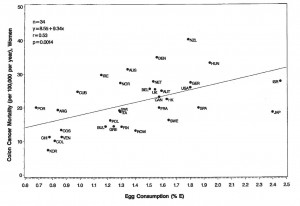
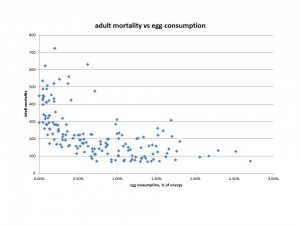
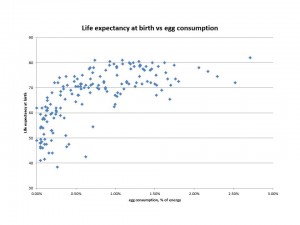
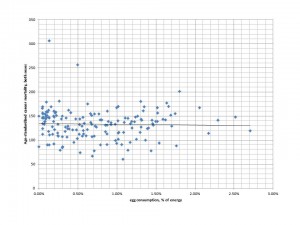
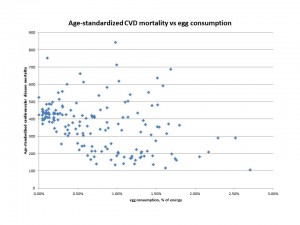
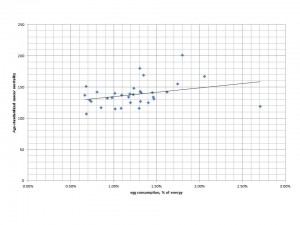




I do have to admit I digest egg whites much better than whole eggs, regardless if they are organic or not. whole eggs give me a headache and make me very lethargic.
You might just be allergic to eggs.
Have you tried 1) different diets for the chickens 2) different avians for your eggs?
You might be reacting to the feed; lots of people have trouble with grain-raised chicken eggs. Afterall, you are what your food eats. (It’s why everything tastes like chicken. Chicken tastes like corn, and everything eats corn so everything tastes like corn.)
You might just not react well to chicken eggs, but there’s all kinds of other eggs, most easily found in asian groceries.
porfavor, queremos el libro en español 🙂
> There has not to my knowledge been proposed any
> plausible mechanism by which eggs promote
> cancer generally or colon cancer specifically.
Isn’t it the arachidonic acid (AA) contained in egg yolks metabolized via COX and 5-LOX which are associated with cancer? Example:
http://www.ncbi.nlm.nih.gov/pubmed/18927292
After all, AA is the end result of Omega-6 intake. It makes little sense to avoid Omega-6 as toxic but also ignore the potential culpability of AA (which is contained pre-formed in meats, egg yolks, etc..)
Maybe, although those act on AA in the cell membranes of the tumor cells and it is not clear that dietary AA which is absorbed in the small intestine has any influence at all on AA levels in colon tumors.
Having grown up a vegetarian, I am still learning to cook meat. Will boiling ground beef create HCAs? I find it a simple and cleaner way to cook meat (which I swore I would never do, but here I am…) Thank you for your patience with my ignorance! Again, meat is a new thing for me.
Boiled meat is fine, no HCAs there.
Boiled meat is fine, but if you cook it too fast it can get all lumpy, which is, if nothing else, viscerally unpleasant. Basically, you’re just making soup with nothing but meat in it, and that’s always good for you. Just don’t rush it.
I tend to put my meat in the oven before I go to bed, at the lowest temp the stove can manage, and then it’s good to go in the morning. 🙂
crockpot is an excellent way to cook meat low and slow as well; you don’t even need to add water, just a bed of chopped onions or other vegetable, meat on top.
Crockpot is also an excellent way to turn a tough, chewy, cheap hunk of meat into a soft, savory treat. I like to smear coconut oil on top to give it a crisp edge and a juicy center, much like barbecue. A great way to get into grass-fed meat on a budget.
Great post Paul! I’ve been missing the science on your blog. I was hoping you’d start engaging the vegan arguments and critique of Paleo/PHD one day since most of the health-conscious people I know are vegans who are truly convinced of the healthfulness of their diet. I think good science is the best way to get through to them.
I’ve missed the scientific informative articles as well. : )
+1 for more blog posts:)
Yes, I do want to do a vegan/vegetarian series.
Once I’m done with my video/talk series I’ll have plenty of blog material ready to go.
That’s great news! I can’t wait! 😀
This!
eggs continue to be controversial, already had similar discussion here.
as i see it, eggs contain complex building proteins and aggressive sulfur-phosphor-lecitin elements that will attack and destroy intestinal walls, be hard to digest, deposit as pus, leading to inflammation later on, cause swollen nose etc.
they are to grow new life, not serve as ingestible food, which ideally is always grown out and unfolded proteins. just like grains will have the same detrimental effect, if also not as fullblown as eggs.
why this infatuation with eggs anyway? wait a little and eat the chicken instead!
as to rice, certainly some of the least harmful grain out there, yet considering the heavy pesticide use not quite ideal either. why not go for sweet potatos?
nothing against those slow cooked or raw beef and lamb though 😉
Hi Paul,
Is pressure cooking a worry for HCA?
Erich
No. Any cooking method that uses water is safe.
Great post! I’m curious about your recommendation to eat 3 yolks a day. I eat 3 eggs for breakfast 4 or 5 days of the week. I’d have thought that yolks plus egg white would make the ideal combo, but you’re saying ideally I should skip the whites?
No, you can eat the white. I skip the white personally, it is protein only and a harder source of protein to digest than meat or fish, so that’s where I choose to get my protein. I do fry whole eggs, or eat hard-boiled eggs, sometimes. But usually I mix the yolks into leftovers or soup and microwave them.
What do you do with all those leftover egg whites? I buy pastured eggs directly from the farmer and it would be a shame to throw the whites away.
I discard them, but I’m sure your farmer would love to get them back for use as chickenfeed.
Just a thought, you should develop a PHD meringue for your cookbook. Traditionally It’s just egg whites and sugar, I’m sure you could find some kind of more friendly sugar substitute. You could do a PHD version of the forgotten cookie (you put them in the preheated oven and turn it off and leave them overnight).
I cook up my pastured egg-whites and give them to my dog 😀
I make scrambled eggs every morning with 1 whole egg and 2 yolks – delicious! However, sometimes I will save the whites over the course of a couple days and make these as a treat: http://www.pinterest.com/pin/155444624610512581/ You have to be careful not too eat too many, though – they are about 1 egg yolk per chalupa! 🙂
Thank you, Teresa. This looks like a good recipe for GF tortillas using a lot of egg whites. I will it add to a list of recipes I am accumulating on savory and less-sweet uses for egg whites.
I’d love to know some of your egg-white recipes! 🙂
When you are saying the Japanese have the highest longevity with the highest intake of eggs – how do you factor in their very low fat intake. It’s possible with a high fat intake eggs might be detrimental. I’m not sure you can make the logical leap you imply.
Paul doesn’t make any leaps here. This article isn’t his first or final word on eggs. The point of this particular piece was that the narrow selection of data in the negative reviewer’s cited studies don’t prove that eggs are bad. Correlation is not causation and If anything, if we are honest and include all the data, the correlation is in favor of eggs.
Hi Paul,
Just finished reading the entire book cover to cover in 2 days (mind blown!) and I’m getting hung up on the recommendation of 3 egg yolks daily along with an 8/16 IF window. If you’re only eating in an 8 hour window, that means you are generally only eating 2 meals per day, correct?
And if you’re eating 3 egg yolks per day that means half of your meals would need to include 3 egg yolks? Are there other ways to get 3 yolks into your diet besides centering a meal around them? I’m not sure I can really eat eggs for 50% of my meals for the rest of my life, that sounds terminally boring!
Thanks for clarifying, I really love your book.
Mash the yolks into potatoes, or rice, or add them to a soup, they then count as your fat, so you still can have a protein at that meal
Good suggestion Ellen! Can you just add raw yolks to the hot potatoes and they will cook or do you need to somehow cook the yolks?
Any sauces that can be made from yolks?
The yolks should be eaten raw, because heat can destroy some of the nutrients. But I guess it’s fine to add them to hot food, as long as you don’t cook them.
Yeah, so, hi. I’m curious, where are you getting the “don’t cook the egg yolks, thing?” I don’t recall that Paul has said anywhere that you shouldn’t cook the egg yolks. In fact, when I asked this same question (because for nursing moms and pregnant women he recommends 5 egg yolks a day!) he recommended putting them in soup or on a bimbimbap (sp?), or making a creme brulee — all of which are cooked eggs. Can you point me to a place where eating only raw yolks is recommended? Thanks for your help.
Hi Elizabeth,
I recommend cooking or at least warming the yolks, which makes them more digestible.
Holla at a Hollandaise daze for days!
i’m glad you’re back to blogging again
i was getting so bored for months. XD
you did a rebuttal so gentlemanly. kudo.
ps. didn’t you or someone else mention that cooking meat (<~ 200 C) also minimize AGE?
i only use high heat for stir fry. otherwise, really does not work. but it can be fried very quickly.
cheers,
I have heard that the soy from grain can get through to the chicken eggs. I get eggs from a local farmer whose chickens run free, yet have the supplemental grain food. How important is it that the eggs are soy free?
Hi grae,
The soy does get through. I don’t think it’s that important unless you are soy sensitive, given that the proteins have been digested once by the chicken and will be digested again by you, the odds of harm are low compared to eating soy yourself.
Thank you so much! That is why we need you and people like you who know the science rather than the myths that circulate. I am grateful.
With regard to soy in laying hen diets, and broiler diets, too, most commercial poultry feed relies almost entirely on soybean meal as the crude protein (CP) source. There is a small amount of CP included in the diet from corn.
About 50% of what goes in the chicken comes out the back end, the rest is broken down into it’s smallest components. In the case of CP, that would be individual amino acids. While the dietary CP source may have been soybean meal, once in the hen’s digetive system, it’s broken down into amino acid building blocks. Those amino acids cross over into the hen’s body and are reconstituted into an entirely different CP profile (the types and relative amounts of amino acids present in the protein source) in the egg. Any unused or un-needed amino acids will be excreted.
Paul is exactly right, with regard to soy-sensitive people having a reaction to eating eggs from chickens fed a standard corn-soy diet,the risk is infinitesimal.
Echale3, Once again, thank you so much. I am grateful to find a place for answers instead of the craziness on the internet and other guessers.
It’s not the protein that is the issue, but the isoflavones.
https://etd.ohiolink.edu/ap:10:0::NO:10:P10_ETD_SUBID:68280
Which means….? Do the isoflavones come through more strongly?
Hi MG,
From that paper, “Enhancement of the diet with 500 mg isoflavones/100g feed resulted on egg yolks containing 1000μg isoflavones/100g” — ie, the concentration of isoflavones in the eggs was 1/500th that of the feed. Eggs from soy-fed chickens are clearly much safer than soy.
EPA is precious in order to compete with AA for same enzymes in Inflammation Paths (Eicosanoyds) – similar molecular shape (20:5n3 vs 20:4n6)
So, EPA in good because AA is bad.
This is why LA is “toxic”, as AA precursor – not only peroxidation polyunsaturated fats – I’ve got both PHD Edition – I’m a big fan, but this one is the ONLY point that does not convince me at all… !!!
AA precipitates inflammation irrespectively the trigger – it’s bad per se.
LA the Devil, AA not so much… this does not work to me.
Hi Alessandro,
In a healthy person on a good diet, inflammation is beneficial — it is needed as part of the immune and wound healing process, and as part of food digestion.
AA is required for good health, so it is not “bad per se.”
Similarly LA in moderation is good, but in excess it is bad. Unfortunately, LA is what people are getting in excess.
Here is some more on AA
http://www.westonaprice.org/know-your-fats/good-fats-bad-fats-separating-fact-from-fiction
http://robbwolf.com/2012/09/06/arachidonic-acid-animal-fats-limit-them/
http://afsjournal.blogspot.com/2010/07/overview-of-chris-masterjohns-report-on.html
Cookies from egg-white
Mix a little lemon juice, a little zest, and 100g of almond flour in a bowl. Add a little melted butter (maybe 20 or 30 grammes) and then gently-beaten egg-whites until a slightly sloppy batter is produced.
Cook spoonfuls on a greased baking sheet, or (better) on rice-paper, slowly until just starting to brown at the edges..
Low carb, gluten-free, non-wasteful, and delicious.. I’ve never managed to find out how long they keep..
Helen that sounds great! How many egg whites do you use?
Ah, depends on how big the eggs are.. We buy enormous ones, so one or two.. DON’T use those nasty egg-beater things..
Helen – another great use for egg whites! Thanks for posting this – I’ll have to give it a try.
Thank you, Helen. This recipes looks like another great use for egg whites; I’ll definitely give it a try.
You can add spices for a Christmassy treat, or orange peel, or a few flaked almonds for the look of it..
I think that Paleo – Low Carb – Primal Community, even doctors and Scientists, have not really read/understood the Zone/Sears Hypotesis on molecular inflammation.
I think there is a sort of Snob Attitude towards a Pop Star Doctor selling Enerzone Products and Fish Oil, but I think Sears is a scientist in any case.
Talking about n6/n3 ratio is not really enough.
–
Sears vision states:
Trigger (infection/antigen/trauma/allergen/chem-toxin) – AA/EPA too high and DGLA/AA too low in blood and tissue – Chronic Inflammation – Pathology –more Trigger- Vicious Cycles
Trigger (infection/antigen/trauma/allergen/chem-toxin) – AA/EPA good and DGLA /AA good in blood and tissue – short, limited, beneficial inflammation – recovery
–
The key point in Sears Vision is: any Trigger becomes dangerous in a high AA/EPA tissue – pre-existant inflammation drives more infection and more triggers.
Your vision is almost the opposite: Trigger (es. infection) drives inflammation and almost determines the AA endogenous elongase-desaturase from LA (veg oils) – direct AA in food is irrelevant.
Truth is difficult and complexity always dominates, but I think the here’s the key.
Have you really valued the Sears vision (es. Anti Aging Zone Book) and what you really think about it?
–
I’ve got great interest in your opinion, thank you very much for sharing your science, best Alessandro.
Hi Paul, just curious…if one has both fungal and bacterial infections, would you use antibiotics and anti-fungals like nystation/diflucan? How do you know which to treat first?
Thanks.
Hey Paul,
Are any of the recommended supplements better taken on an empty stomach? Perhaps during the fast? It’s hard for me to find these particular bits of info via internet searches for some reason. It seems rarely discussed.
I second that, something i always been wondering. The only thing the book tells you is to take magnesium right before bedtime.
I’m really glad I read this article. Firstly because I love eggs, secondly because I sometimes can be a naive reader(although I don’t go to Victors extremes)But this was a great rebuttal to show us that we should not believe everything that we read and to look at more then one source. Loved the way you handled this
Paul,
looks like some 1-star reviews come from VLC people.
so you must be doing something right!
cheers,
Hi Paul:
Where do you come out on adding potato starch/resistent starch to PHD?
Seems to be increasing discussion of this, but not sure where the science really is at.
Thanks
Go to freetheanimal.com and look for the wealth of info and references Richard and tatertot Tim have compiled on RS….
In my experience, it works quite well on several levels.
Such a informative post. I loved to eat yolk part of the egg, full of vitamins and minerals.Thanks for providing the book ” Perfect Health Diet”.Very soon i will buy this wonderful book.
The review thread at amazon flew entirely off the rails. Victor undermines himself, and sadly at thst. Eating a more healthful would make a huge impact in his quality of life.
Hi Paul if the soy does come through in small amounts from soy fed chickens then would this apply to the yolk or egg white only, or both?
As someone who eats 2-3 eggs a day, I am hoping they are not causing me harm. Most of what I have read on this thread is reassuring. But there is one more hurdle: several studies in the last few years linking egg consumption with a dramatically increased risk of lethal prostrate cancer. I haven’t seen any convincing rebuttal to these studies to date. Can anyone help me out on this one?
here you go Mike
http://www.ncbi.nlm.nih.gov/pubmed/23167401
Thank you, Chris. I really appreciate it. I had actually seen that study before, a meta-analysis from 2012 that shows no link between egg consumption and prostate cancer. But the worrisome studies I saw were, I believe, from 2013, and I haven’t seen anyone look at the meta-analysis and the worrying studies side by side and figure out which is more reliable and/or why they come to starkly contrasting conclusions. In fact the meta-analysis cautions that more studies are needed. So … ?
I think you’re barking up the wrong tree. Prostate cancer is a toxic estrogen issue as the prostate is the vestigal uterus of a female. But if you’re concerned that arachidonic acid (AA) could inflame the cancer expression pathways, then get your AA levels checked to make sure they’re not excessive.
Hmmm.interesting,maybe Paul would like to comment on the supposed
Link to prostrate cancer,I’m also a 3 a day person .
Dairy because of its IGF1 is another food type pushed into the firing line,I love
Unpasteurised Canadian cheddar as it seems to sustain me.
Is organic corn safe starch to eat? Thanks
I’m afraid we don’t consider corn a safe starch, organic or not.
Hi Paul,
what is your take on the supposed link of the choline (found in eggs) and the risk of cancer?
thx
Hi Alex,
(a) I doubt the link, (b) nutrients that promote cancer growth are often nourishing for normal cells and preventative of cancer development in the first place, so the general population should not avoid them even if cancer patients should, and (c) even if it were true, the benefits of choline for suppression of cardiovascular disease and diabetes far outweigh whatever its contribution to cancer risk may be.
thank you for your answer, Paul.
Could you please elaborate shortly on what leads you to doubt the link (maybe some convincing piece of research or so)?
Hi Paul,
I eat lots of pastures eggs. I have between three and six a day. I’m definitely not pregnant, so is there a concern for overdoing the eggs? Thanks.
Jeff
Paul: I believe that the problem with meat is how it is raised, processed and
cooked, not that meat itself is unhealthy. Eggs, well if the chickens are raised
and fed right, it is a health food packed with nutrients that the body needs.
My diet includes mainly fruits and veggies, some meat and eggs, quinoa,
oats, nuts. I avoid wheat like the plague and limit rice, but do indulge in
popcorn popped in coconut oil.
Your arguments are solid.
Kevin
trying to subscribe but optin seems to be busted. Hopefully leaving a comment with my email will work 🙂
Hi Paul,
First of all thanks to share your discoveries with us;
Your book is amazing!
I’ve a question:
U say to eat 3egg yolks per day (so 21per week).
Is it ok if i eat 7-7-7 in three days instead 3 everyday?
Thx 😛
Yes.
same thing for natto (for vit. K2) right?
Shou-Ching and Paul, have you considered recommending duck eggs as an alternative?
They do offer several advantages:
– Higher yolk to white ratio (in a chicken egg, it is around 30-40% yolk, while in a duck egg the yolk can be in the 50-65% range). That of course has other associated advantages with more yolk.
– More favorable fatty acid profile. Compare the percentage of PUFA in duck vs chicken.
– They generally have a richer taste as they have more fat in the yolk as well.
– Excellent source of vitamin D ( at least the pasture raised ones anyways).
Duck eggs are widely eaten in the Asian community, particularly when salted. You’ll also note the “whiter” white (more albumen in whites than chicken eggs).
Just be careful when cooking not to overcook as they have less water (if you overcook, there’s less margin as the egg with taste “rubbery”).
Likewise, for those that eat lots of poultry, it may be worth considering duck meat over chicken.
Hi Paul,
Do the yolks taken from hard boiled eggs still contain the choline and folate or will the cooking have destroyed the nutrients somewhat?
Thank you,
Claire